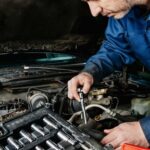When your car needs repairs, understanding your rights can save you from unexpected costs and headaches. In North Carolina, the law provides specific protections for consumers regarding auto repairs, especially when it comes to estimates. Knowing whether an auto repair estimate is required by law in NC is crucial for any car owner in the state. This article will clarify your rights and guide you through the essentials of auto repair estimates under North Carolina law.
Navigating the world of auto repair can be daunting. Finding a trustworthy mechanic is the first step. Recommendations from friends and neighbors can often lead you to reputable shops. Be cautious of any shop demanding upfront payment and always inquire about warranty terms before authorizing any work. Look for mechanics certified by ASE (National Institute for Automotive Excellence) and ensure the shop displays a sign outlining your rights under North Carolina law. Before any examination, confirm the diagnostic cost in writing.
Understanding the NC Motor Vehicle Repair Act
The cornerstone of consumer protection in auto repair in North Carolina is the Motor Vehicle Repair Act. This act is designed to protect you when repair costs exceed $350. So, is an auto repair estimate required by law in NC? Yes, under this act, if your repair is expected to cost more than $350, the repair shop is legally obligated to provide you with a written estimate. This estimate must be presented to you before any repair work begins, and you’ll need to sign an authorization for the repair to proceed.
Key provisions of the Motor Vehicle Repair Act include:
- Written Estimate: For repairs over $350, a written estimate is mandatory. This document should detail the proposed work and costs.
- Authorization: You must authorize the repairs, ideally in writing, after reviewing the estimate.
- Return of Old Parts: You have the right to request the return or examination of replaced car parts. Make this request when you authorize the repair.
- Storage Charges: The repair shop must inform you of any storage fees that may accrue if you don’t collect your vehicle promptly after repairs are complete.
- Cost Overruns: Without your explicit permission, the final repair cost cannot exceed the authorized estimate by more than 10 percent.
- Diagnosis Costs: If the problem is unclear, the shop must disclose the diagnostic fee. Once diagnosed, they must provide an estimate for the repair and obtain your authorization before proceeding with the work.
- Detailed Invoice: Upon completion, you are entitled to a detailed invoice. This invoice must itemize all charges for labor and parts, clearly indicating whether parts are new, used, or reconditioned.
- Flexibility in Part Markups: Be aware that repair shops have the discretion to mark up parts prices.
- Payment for Authorized Repairs: You are responsible for paying for all authorized repairs, even if the issue persists after the service.
- Exclusions: The Motor Vehicle Repair Act does not cover agricultural equipment or vehicles weighing over 26,000 pounds.
Additional Consumer Protections
Even if your auto repair falls under $350 or involves excluded vehicles, you are still protected by the North Carolina Unfair and Deceptive Trade Practices Act. This broader law safeguards consumers against unfair practices in all business dealings, including auto repairs. If you believe you’ve been subjected to unfair or deceptive practices, this act provides recourse.
Seeking Assistance
If you encounter issues with auto repairs or believe your rights have been violated, help is available. You can contact us for help or call toll-free within North Carolina at 1-877-5-NO-SCAM to file a complaint with the North Carolina Department of Justice. Understanding your rights and knowing where to seek assistance are vital steps in ensuring fair auto repair experiences in North Carolina.

